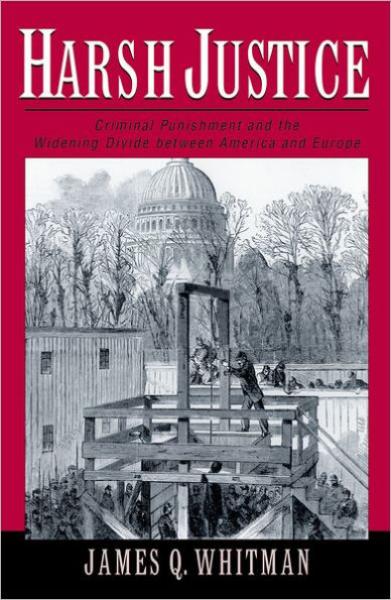Description
Criminal punishment in America is harsh and degrading--more so than anywhere else in the liberal west. Executions and long prison terms are commonplace in America. Countries like France and Germany, by contrast, are systematically mild. European offenders are rarely sent to prison, and when they are, they serve far shorter terms than their American counterparts. Why is America so comparatively harsh? In this novel work of comparative legal history, James Whitman argues that the answer lies in America's triumphant embrace of a non-hierarchical social system and distrust of state power which have contributed to a law of punishment that is more willing to degrade offenders.
"In focusing his considerable historical and narrative talents on the question of status and degradation in the history of punishment, Whitman has done legal historians, criminologists, and cultural theorists a great service. For these reasons alone, Harsh Justice should quickly establish itself as a must-read book in the world of criminal law and cultural legal studies."--Rechts Geschichte
"Whitman's whirlwind tour of the punishment practices of three countries over the last two centuries is well worth the price of admission. He has a deep pool of knowledge and an eye for the telling detail--a picture, a turn of phrase, or a small historical event--that helps to advance his thesis."--Boston Review
"Its combination of elegant writing, deep erudition and bold theorizing make the book a terrific read. Indeed, it ought to be required reading for anyone interested in how a society comes to punish the way it does--and how it should."--American Prospect
"In a thoroughly researched book that draws on a wide variety of sources from all three countries, Whitman presents innumerable fascinating details about the historical development of sentencing at home and abroad and debunks a variety of myths in doing so. His excellect overall knowledge of setencing developments on both sides of the Atlantic merges with his deep insights into other cultural, political, and legal traditions, especially in the areas of privacy and insult."--Michigan Law Review
"In focusing his considerable historical and narrative talents on the question of status and degradation in the history of punishment, Whitman has done legal historians, criminologists, and cultural theorists a great service. For these reasons alone, Harsh Justice should quickly establish itself as a must-read book in the world of criminal law and cultural legal studies."--Rechts Geschichte
"Whitman's whirlwind tour of the punishment practices of three countries over the last two centuries is well worth the price of admission. He has a deep pool of knowledge and an eye for the telling detail--a picture, a turn of phrase, or a small historical event--that helps to advance his thesis."--Boston Review
"Its combination of elegant writing, deep erudition and bold theorizing make the book a terrific read. Indeed, it ought to be required reading for anyone interested in how a society comes to punish the way it does--and how it should."--American Prospect
Last updated on
Product Details
- Oxford University Press, Brand
- Apr 1, 2005 Pub Date:
- 019518260X ISBN-10:
- 9780195182606 ISBN-13:
- 311 Pages
- 9.3 in * 6.2 in * 0.81 in Dimensions:
- 1 lb Weight:




